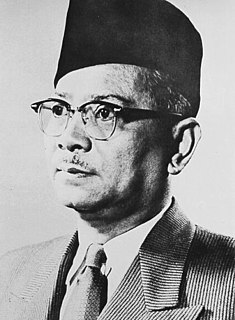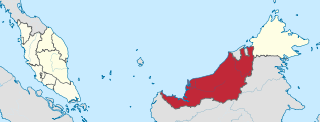
The Barisan Alternatif was a coalition of Malaysian opposition parties, formed as a counterweight to the ruling Barisan Nasional. Disbanded after the 2004 general elections, all 4 former component parties of BA have formed a new coalition, Pakatan Rakyat, following the 2008 general elections.

A general election was held on Monday, 29 November 1999 for members of the 10th Parliament of Malaysia. Voting took place in all 193 parliamentary constituencies of Malaysia, each electing one Member of Parliament to the Dewan Rakyat, the dominant house of Parliament. State elections also took place in 394 state constituencies in 11 out of 13 states of Malaysia on the same day.

A general election was held on Saturday, 10 May 1969 for members of the 3rd Parliament of Malaysia, although voting was postponed until between 6 June and 4 July 1970 in Sabah and Sarawak. This election marked the first parliamentary election held in Sabah and Sarawak after the formation of Malaysia in 1963.

Elections in Malaysia exist at two levels: federal level and state level. Federal level elections are those for membership in the Dewan Rakyat, the lower house of Parliament, while state level elections are for membership in the various State Legislative Assemblies. The heads of executive branch at both the federal and state levels, the Prime Minister and Menteri Besar/Chief Ministers respectively, are indirectly elected, usually filled by a member of the majority party/coalition in the respective legislatures.

The ninth Sarawak state election was held on Saturday, 20 May 2006 with nomination day on Tuesday, 9 May 2006. The election functioned to elect 71 representatives to the Sarawak State Assembly. The eighth state assembly was dissolved by Yang di-Pertua Negeri Sarawak, Tun Abang Muhammad Salahuddin Abang Barieng by the advice of Chief Minister Abdul Taib Mahmud, on 24 April 2006.

A general election was held between Saturday, 8 July and Saturday, 22 July 1978 for members of the 5th Parliament of Malaysia. Voting took place in all 154 parliamentary constituencies of Malaysia, each electing one Member of Parliament to the Dewan Rakyat, the dominant house of Parliament. State elections also took place in 276 state constituencies in 10 states of Malaysia on the same day.

A general election was held between Saturday, 24 August and Saturday, 14 September 1974 for members of the 4th Parliament of Malaysia. Voting took place in all 154 parliamentary constituencies of Malaysia, each electing one Member of Parliament to the Dewan Rakyat, the dominant house of Parliament. State elections also took place in 360 state constituencies in 12 states of Malaysia on the same day.
The 2007 Machap by-election was held on 12 April 2007. The seat in the state assembly of Malacca, Malaysia, fell vacant after the incumbent, Datuk Wira Poh Ah Tiam of the Malaysian Chinese Association (MCA), died on 15 March that year. On 21 March 2007, the Election Commission of Malaysia (EC) announced 3 April 2007 as the nomination day and 12 April 2007 the election date. The MCA candidate, Lai Meng Chong eventually defeated the opposition candidate of Liou Chen Kuang, with a reduced majority compared to the previous 2004 election.

A general election was held on Saturday, 8 March 2008 for members of the 12th Parliament of Malaysia. Voting took place in all 222 parliamentary constituencies of Malaysia, each electing one Member of Parliament to the Dewan Rakyat, the dominant house of Parliament. State elections also took place in 505 state constituencies in 12 out of 13 states on the same day.

Dato' Ustaz Haji Fadzil bin Muhammad Noor was a Malaysian politician and religious teacher. He was the president of Pan-Malaysian Islamic Party (PAS) from 1989 to 2002 and Leader of the Opposition in the Parliament of Malaysia from 1999 to 2002.

The Pakatan Rakyat or PR was an informal Malaysian political coalition and successor to Barisan Alternatif (BA). The political coalition was formed by the People's Justice Party (PKR), Democratic Action Party (DAP), and Pan-Malaysian Islamic Party (PAS) on 1 April 2008, after the 12th Malaysian general election, having previously formed the Barisan Alternatif in the 10th general election. On 20 April 2010, the Sarawak National Party (SNAP) officially joined as a member of the Pakatan Rakyat after being expelled from Barisan Nasional, but quit the coalition on 6 May 2011. The DAP declared the coalition "dead" on 16 June 2015, citing the inability of the rest of the alliance to work with PAS, after PAS's congress passed the motion to sever ties with DAP without debate. It was succeeded by Pakatan Harapan and Gagasan Sejahtera.
A by-election was held for the Dewan Rakyat parliamentary seat of Permatang Pauh on 26 August 2008 with nomination day on 16 August 2008. The seat of Permatang Pauh in the Dewan Rakyat, fell vacant after the resignation of the incumbent, Datuk Seri Wan Azizah Wan Ismail, on 31 July 2008. Wan Azizah was the Leader of the Opposition as well as the President of the Parti Keadilan Rakyat (PKR), a component party of the opposition Pakatan Rakyat (PR) coalition. The by-election was contested by the PR candidate former Deputy Prime Minister Anwar Ibrahim. This election has been dubbed "the mother of all by-elections" by the media due to the potentially significant implication of the election as well as the high profile of Anwar Ibrahim.
Kuala Terengganu by-election of 2009 was held on 17 January 2009 after the death of the incumbent Member of Parliament, Razali Ismail. In the 2008 election, Datuk Razali won by a slim 628 vote majority, defeating Pan-Malaysian Islamic Party (PAS) heavyweight Mohamad Sabu and 89-year-old independent candidate, Maimun Yusuf. Prime Minister Datuk Seri Abdullah Ahmad Badawi and Barisan Nasional were confident that Barisan Nasional would retain the Kuala Terengganu parliamentary seat. The Prime Minister had rejected the assumption that there would be a big swing by the voters to the Opposition. Opposition leader Anwar Ibrahim stated that Parti Keadilan Rakyat (PKR) and the Democratic Action Party (DAP) would support any candidate that PAS picked. He was optimistic that Pakatan Rakyat would win in Kuala Terengganu if all its coalition parties worked hard against Barisan Nasional. In the 2008 election Razali, a government minister of the UMNO party, defeated a PAS opposition candidate by 628 votes. For the by-election PAS nominated state assemblyman Mohd Abdul Wahid Endut, while Barisan Nasional nominated Wan Ahmad Farid Wan Salleh. Mohd Abdul won the by-election by 2,631 votes.
Dato' Haji Salahuddin bin Ayub is a Malaysian politician currently serving as the Minister of Agriculture and Agro-Based Industry since 21 May 2018. Salahuddin is also the Member of Parliament for the Pulai constituency in Johor and the Johor State Legislative Assemblyman for the seat of Simpang Jeram concurrently. He is the Deputy President of Parti Amanah Negara (AMANAH), a component of Pakatan Harapan (PH) coalition.
Datuk Seri Dr. Mujahid bin Yusof, commonly referred to as Mujahid Yusof Rawa, is a Malaysian politician and is the Member of Parliament (MP) of Malaysia for the Parit Buntar constituency in Perak. He is a member of the National Trust Party (AMANAH), a component party in Pakatan Harapan (PH) coalition.
Datuk Seri Panglima Haji Abdul Ghapur Salleh is a Malaysian politician. He was the former Member of the Parliament of Malaysia for the Kalabakan constituency in Sabah, representing the United Malays National Organisation (UMNO) in the governing Barisan Nasional (BN) coalition from 2004 to May 2018.
The Sibu by-election, 2010 was a by-election for the seat of Sibu in the Parliament of Malaysia. The Sarawak-based seat fell vacant after the death of its incumbent member, Robert Lau Hoi Chew, from liver cancer on 9 April 2010. The seat was defended for the Barisan Nasional coalition government by Robert Lau Hui Yew of the Sarawak United Peoples' Party (SUPP), while Sarawak State Assemblyman Wong Ho Leng contested the poll for the Democratic Action Party (DAP) in the Pakatan Rakyat opposition coalition. Wong won the election by 398 votes, wresting the seat from the Barisan Nasional.

The tenth Sarawak state election was held on Saturday, 16 April 2011 after nomination for candidates on Wednesday, 6 April 2011. The purpose of the election was to elect 71 representatives to the Sarawak State Assembly. The ninth state assembly was dissolved by Yang di-Pertua Negeri Sarawak, Tun Abang Muhammad Salahuddin Abang Barieng on the advice of Chief Minister Abdul Taib Mahmud on 21 March 2011. The previous state election in Sarawak was held in 2006.
Dr. Chen Man Hin is a Malaysian politician from Democratic Action Party. He won the contest in the 1965 by-elections. He won in Seremban, Negeri Sembilan state in 1974. He contested under the DAP ticket against Barisan Nasional. Since 1965, he has been in DAP politics fighting for justice, democracy and security as the DAP struggles.




















